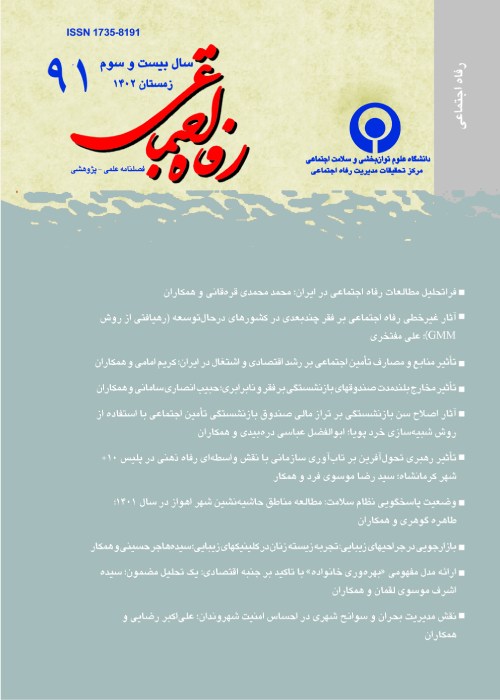Developing the National Plan of Reducing and Control of Social Problems
Author(s):
Abstract:
Objective
Lake of comprehensive, strategic planning for reduction and control of octal problems in the country has always been a weak point in the national struggle again st social problems. The in am objective of this study was to produce a comprehensive national plan on the basis of maximal professional consensus among experts and beads of governmental organizations, for intervening to reduce and control social problems in the country. Methods
This was a qualitative study which was carried out In 4 stages, during which the first, second, third and fourth (final) drafts of the document were produced respectively, utilizing existing official information and expert viewpoints, during the process of several focus group discussions and Delphi procedures! Results
The final document consists of 10 parts: Introduction, definitions, goals, review of literature, situation analysis, challenges, policies and strategies, plans and projects, executive guideline, and national task division. The main goals of the document are: promotion of social welfare and quality of life of the population, reduction of the incidence and prevalence of social problems, and reduction of the harms secondary to them. The final document is a national plan with a muiti-sectoral approach, which has covered the issue of social problems from all possible aspects and therefore lacks any gaps or overlaps in task division among the different organizations involved. This national plan includes longterm goals, seeking the roots of social problems, as well as shortterm objectives aiming at more tangible and urgent needs. The “projects” are all In congruency wIth the “policies”, “goals”, and “strategies” of the national plan, which have themselves been derived through a SWOT (strengths, weakpoints, opportunities, threats) analysis. Discussion
The level of cooperation of experts from different branches of science and officials from different governmental and non-governmental organizations, was more than expected, and consistent throughout the process of the study, the former being even higher than the latter. There were also some concerns such as the existing dominant “sectoral”approach in many participants and the higher tendency towards short4crm goals and outcomes in many others. Another Important concern Is that de~$te the fact that responsibilities have been assigned to non-governmental organizations throughout the present document, the role of such organizations in the actual structure of the national struggle against social problems Is undefined and thus apt to gradual disappearance if special attention and Intervention is not provided instantly for the issue. The authors recommend that the Mhiistry of Soeial Welfare and Security, on behalf of its mission and legal responsibility, and due to its core and key role in social aspects, take serious and effective steps for implementing this national plane.Keywords:
Language:
Persian
Published:
Social Welfare Quarterly, Volume:8 Issue: 32, 2009
Page:
67
magiran.com/p1244632
دانلود و مطالعه متن این مقاله با یکی از روشهای زیر امکان پذیر است:
اشتراک شخصی
با عضویت و پرداخت آنلاین حق اشتراک یکساله به مبلغ 1,390,000ريال میتوانید 70 عنوان مطلب دانلود کنید!
اشتراک سازمانی
به کتابخانه دانشگاه یا محل کار خود پیشنهاد کنید تا اشتراک سازمانی این پایگاه را برای دسترسی نامحدود همه کاربران به متن مطالب تهیه نمایند!
توجه!
- حق عضویت دریافتی صرف حمایت از نشریات عضو و نگهداری، تکمیل و توسعه مگیران میشود.
- پرداخت حق اشتراک و دانلود مقالات اجازه بازنشر آن در سایر رسانههای چاپی و دیجیتال را به کاربر نمیدهد.
In order to view content subscription is required
Personal subscription
Subscribe magiran.com for 70 € euros via PayPal and download 70 articles during a year.
Organization subscription
Please contact us to subscribe your university or library for unlimited access!


